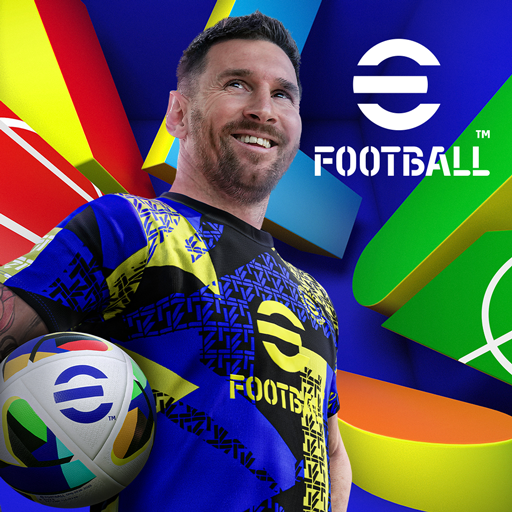| App Name | eFootball™ |
|---|---|
| Publisher | KONAMI |
| Genre | Sports |
| Latest Version | 9.1.1 |
| Update on | Oct 17, 2024 |
| Requirements | 7.0 |
| Get it on |
|
eFootball: The Digital Evolution of the Beautiful Game
Introduction
Football, often referred to as “the beautiful game,” has long been a global phenomenon, captivating millions with its simplicity, excitement, and the deep sense of community it fosters. Over the past few decades, however, the landscape of football has undergone a profound transformation, extending beyond the physical pitch into the digital realm. This transformation has given rise to “eFootball,” a term that encompasses both virtual football video games and the competitive esports scene surrounding them. This article explores the multifaceted world of eFootball, tracing its origins, examining its impact on traditional football, and considering its future trajectory.
The Origins of eFootball
The origins of eFootball can be traced back to the early days of video gaming. As technology evolved, so too did the complexity and realism of football video games. Early iterations, such as “Pong” in the 1970s, laid the groundwork for sports video games, but it wasn’t until the 1980s and 1990s that football games began to capture the essence of the sport more authentically.
Early Video Games and the Birth of Football Simulations
One of the earliest football video games was “Soccer,” released in 1985 by Nintendo for the Nintendo Entertainment System (NES). While primitive by today’s standards, it introduced basic elements of the sport, such as player control and team strategy. The late 1980s and early 1990s saw the release of more sophisticated titles like “Sensible Soccer” and “Kick Off,” which offered improved graphics and gameplay mechanics.
The real breakthrough, however, came with the advent of the “FIFA” series by Electronic Arts (EA) in 1993. “FIFA International Soccer” was the first game to secure an official license from FIFA, the international governing body of football. This allowed the game to feature real teams and players, adding a layer of authenticity that had been previously unattainable. The success of the FIFA series paved the way for other football simulations, most notably Konami’s “Pro Evolution Soccer” (PES), which debuted in 2001.
The Rise of Competitive Gaming
As football video games became more sophisticated, so did the competitive scene surrounding them. The late 1990s and early 2000s saw the emergence of organized tournaments and leagues for games like FIFA and PES. These competitions initially took place on a local or regional level, often organized by enthusiastic fans or gaming communities.
The rise of online gaming in the mid-2000s revolutionized the competitive landscape. With the advent of broadband internet and online gaming platforms, players could now compete against opponents from around the world. This global connectivity laid the foundation for the growth of eFootball as a legitimate esports discipline.
The Evolution of eFootball as an Esport
The evolution of eFootball from casual gaming to a recognized esport has been driven by several key factors, including technological advancements, the growth of online communities, and the involvement of traditional football organizations.
Technological Advancements
Technological advancements have played a crucial role in the evolution of eFootball. Improved graphics, realistic physics engines, and advanced AI have made football video games more immersive and lifelike. Games like FIFA and PES now feature detailed player models, lifelike animations, and sophisticated tactics, providing players with an experience that closely mirrors real-life football.
Moreover, the development of powerful gaming consoles and PCs has enabled the creation of large-scale online multiplayer environments. Players can participate in virtual leagues, tournaments, and even casual matches with friends, all from the comfort of their homes. The introduction of streaming platforms like Twitch and YouTube has further expanded the reach of eFootball, allowing fans to watch live matches, tutorials, and highlights from top players.
The Growth of Online Communities
The growth of online communities has been instrumental in the rise of eFootball as an esport. Platforms like EA’s FIFA Ultimate Team (FUT) and Konami’s myClub have created dedicated spaces for players to build and manage their own teams, compete in online matches, and engage with a global community of football enthusiasts. These platforms offer a range of competitive modes, from casual matches to high-stakes tournaments, catering to players of all skill levels.
Online communities have also fostered the development of grassroots competitions and leagues. Local gaming groups, social media communities, and dedicated websites have emerged as hubs for organizing and promoting eFootball events. These grassroots initiatives have provided a pathway for amateur players to showcase their skills and potentially transition into professional esports careers.
The Involvement of Traditional Football Organizations
The involvement of traditional football organizations has been a significant driver of the legitimacy and popularity of eFootball as an esport. Recognizing the potential of digital football to engage younger audiences and expand their global reach, many football clubs, leagues, and governing bodies have embraced eFootball.
In 2016, the English Premier League (EPL) launched the ePremier League, an official esports competition for FIFA players. This initiative was followed by similar ventures from other major leagues, including the Bundesliga, La Liga, and Serie A. These leagues have partnered with game developers and esports organizations to create structured competitive ecosystems, complete with official tournaments, prize money, and professional contracts.
Football clubs themselves have also entered the eFootball arena, signing professional esports players to represent them in virtual competitions. Clubs like Manchester City, Paris Saint-Germain, and FC Barcelona have established their own esports teams, blurring the lines between traditional football and its digital counterpart. This integration has not only elevated the status of eFootball but also created new revenue streams and marketing opportunities for clubs and players alike.
The Impact of eFootball on Traditional Football
The rise of eFootball has had a profound impact on traditional football, influencing various aspects of the sport, including fan engagement, player development, and commercial opportunities.
Fan Engagement and Community Building
One of the most significant impacts of eFootball on traditional football is its ability to engage and connect fans in new and innovative ways. Digital football games and esports competitions provide fans with interactive and immersive experiences that go beyond simply watching matches on television or attending games in person.
Platforms like FIFA Ultimate Team and PES myClub allow fans to build and manage their own teams, creating a sense of ownership and personal investment. These platforms also facilitate social interactions, enabling fans to connect with friends, join online communities, and participate in competitive leagues. This sense of community is further reinforced by streaming platforms, where fans can watch live matches, interact with their favorite players, and participate in real-time discussions.
Player Development and Scouting
eFootball has also emerged as a valuable tool for player development and scouting. The realistic gameplay mechanics and tactical depth of modern football video games provide players with a unique platform to hone their skills, develop their understanding of the game, and experiment with different strategies.
Many professional football clubs and academies have recognized the potential of eFootball as a training and development tool. Some clubs have incorporated football video games into their training programs, using them to teach tactical concepts, improve decision-making, and enhance players’ cognitive abilities. In addition, eFootball competitions serve as a scouting ground for identifying talented individuals who may possess the skills and attributes needed for a professional career in traditional football.
Commercial Opportunities and Revenue Streams
The integration of eFootball into the broader football ecosystem has created new commercial opportunities and revenue streams for clubs, leagues, and players. The growing popularity of eFootball competitions has attracted the attention of sponsors, advertisers, and media companies, leading to increased investment in the esport.
Sponsorship deals, broadcasting rights, and merchandise sales have become significant sources of revenue for eFootball organizations. Major brands and companies have partnered with football clubs and esports teams to promote their products and services to a global audience. Additionally, the sale of in-game items, virtual currencies, and downloadable content has generated substantial revenue for game developers and publishers.
The commercial success of eFootball has also led to the creation of dedicated esports facilities, training centers, and event venues. These investments have not only elevated the professional standards of eFootball but also provided a boost to local economies and created job opportunities within the industry.
Challenges and Controversies in eFootball
Despite its rapid growth and widespread popularity, eFootball is not without its challenges and controversies. Issues related to fairness, inclusivity, and the commercialization of the sport have sparked debates within the eFootball community and beyond.
Fairness and Competitive Integrity
Maintaining fairness and competitive integrity is a critical challenge in eFootball. The use of advanced AI, sophisticated algorithms, and online matchmaking systems has raised concerns about the potential for cheating, hacking, and exploitation of game mechanics. Developers and organizers must continuously monitor and address these issues to ensure a level playing field for all participants.
In addition, the pay-to-win model employed by some football video games has been a source of controversy. In-game purchases and microtransactions can provide players with competitive advantages, leading to an uneven playing field and raising questions about the ethics of monetizing gameplay. Balancing the need for revenue generation with the principles of fair competition remains a delicate task for developers and publishers.
Inclusivity and Diversity
Promoting inclusivity and diversity within the eFootball community is another significant challenge. While digital football has the potential to reach a global audience, barriers related to access, representation, and cultural differences can limit participation for certain groups.
Efforts to promote inclusivity and diversity within eFootball include initiatives to reduce the cost of entry, create inclusive online environments, and ensure representation of diverse cultures and identities within the games themselves. Developers and organizers must work collaboratively to address these issues and create a welcoming and equitable community for all players and fans.
Commercialization and Player Welfare
The commercialization of eFootball has raised concerns about the welfare of players, particularly young and aspiring professionals. The intense demands of competitive gaming, including long hours of practice, travel, and public exposure, can take a toll on players’ physical and mental health.
Organizations and stakeholders within the eFootball ecosystem must prioritize player welfare by implementing support systems, providing access to mental health resources, and promoting a healthy.
Read more:
https://en.wikipedia.org/wiki/EFootball

